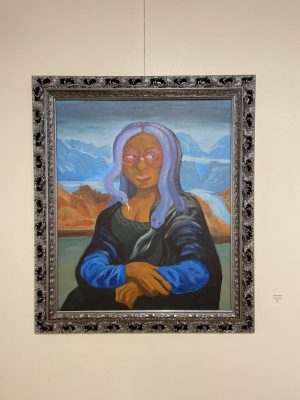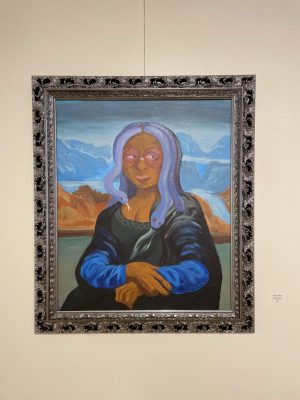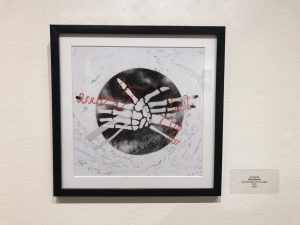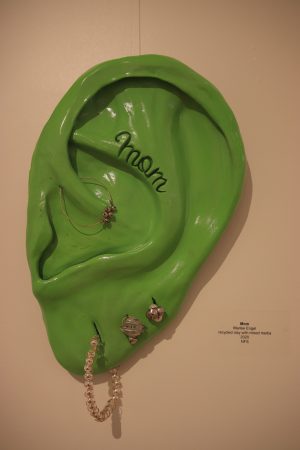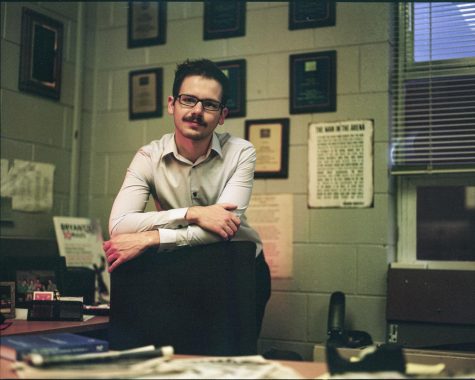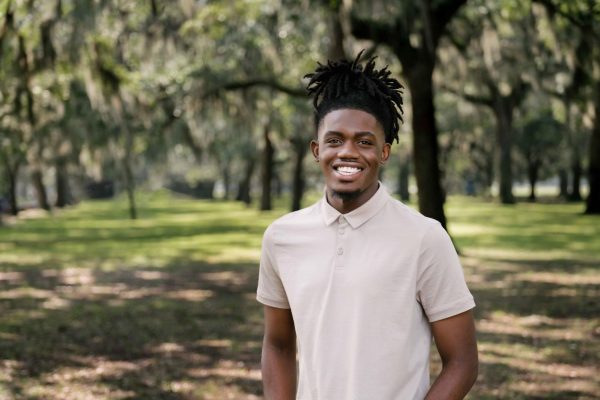Print Editor-in-Chief, Duncan Sligh, interviewed Fine Arts Gallery director, Raymond Gaddy
Duncan Sligh, Jabari Gibbs, and Rebecca Munday
November 30, 2021
INTRO
This was the first audio/visual interview that the George-Anne Inkwell conducted. We sat down with Professor Raymond Gaddy in the Fine Arts Gallery on Wednesday, Nov. 17, 2021 when the senior art exhibit “Change: Subject to Change” was displayed in the Fine Arts Gallery. The gallery is now closed for the end for the semester, but students should look for other exhibits like the ones he mentioned coming to the gallery in the future. We are very thankful for Professor Raymond Gaddy and the Betty Foy Sanders Department of Art on the Georgia Southern Armstrong Campus for participating in this inaugural production and for constantly supporting our publication. We would also like to thank the artists featured in the exhibit for creating these works and allowing us to show them off.
TRANSCRIPT
00:00:00:15 – 00:00:12:15
DUNCAN SLIGH
What’s going on, everybody? My name is Duncan Sligh, and I’m the editor- in-chief of the George-Anne Inkwell Print Edition, and I conducted the interview you’re about to see with Professor Raymond Gaddy. Now, before we begin, I just wanted to thank Professor Gaddy for choosing to be a part of it.
00:00:12:15 – 00:00:25:04
DUNCAN SLIGH
And I want to let you know this is our first time doing this kind of interview. We’re looking to do more of these types in the future. But I hope you enjoy this one is our first time doing it, like I said, so there may be little stumbling blocks in the way, we’re learning as we go.
00:00:25:16 – 00:00:37:07
DUNCAN SLIGH
If you would like to be a part of this, if you want to be interviewed or if you want to help us out. Head on over to the George-Anne Inkwell’s website. It’s www.thegeorgeanne.com/inkwell and you can find more information to get in contact with us.
00:00:37:07 – 00:00:46:08
DUNCAN SLIGH
You can feel free to shoot me an email. And we’d love for you to be a part of our team or if you’d like to get some exposure from us, let us know. That’s all for me. I hope you guys enjoy.
00:00:47:05 – 00:01:03:11
DUNCAN SLIGH
So would you mind introducing yourself just for the folks at home who might be watching or listening?
RAYMOND GADDY
Sure. I’m Raymond Gaddy. I’m an assistant professor of painting and drawing here at the Armstrong campus. And I also have the pleasure of running the Armstrong Gallery of Art.
00:01:04:20 – 00:01:16:15
DUNCAN SLIGH
And how did you how did you find yourself here at Armstrong, at the Armstrong campus? W was your kind of career path that led you to this place?
RAYMOND GADDY
Well, I’ve been in the arts since I was an undergrad.
00:01:16:15 – 00:01:39:13
RAYMOND GADDY
I actually started off in the sciences. I kind of switched in college and then I got my BFA from the University of Alabama Birmingham, moved and got my MFA from the University of Alabama, and I taught a couple of places, ended up in Savannah because of SCAD and then taught in Florida for a couple of years and
00:01:39:13 – 00:01:57:01
RAYMOND GADDY
ultimately ended up here.
DUNCAN SLIGH
Did you teach at SCAD?
RAYMOND GADDY
I did.
DUNCAN SLIGH
What capacity did you teach there?
RAYMOND GADDY
I taught the foundations class classes, which are the introduction to the arts. They tend to be an introduction to drawing and to design, color theory, those sorts of classes.
00:01:57:03 – 00:02:11:13
DUNCAN SLIGH
It’s interesting. I actually went to SCAD very briefly when I graduated from high school. I wanted to be an actor, and so I went there for the performing arts program. I had difficulty there. I had to wake up at 8:00 a.m. to take drawing class, which apparently they’ve changed since I left.
00:02:11:13 – 00:02:22:19
DUNCAN SLIGH
I don’t think performing arts students necessarily have to do that anymore. What do what do you think SCAD has done to the city of Savannah in terms of bringing the arts to the South, I should say.
RAYMOND GADDY
Oh, wow.
00:02:23:07 – 00:02:42:06
RAYMOND GADDY
They’ve done an incredible amount. When I first moved here, it was actually 2001, it’s almost 20 years now, I guess it has been 20 years. And even then the arts felt a little thin around here, from my perspective.
00:02:42:14 – 00:02:59:04
RAYMOND GADDY
I’d come from a very active community, and the just in that 20 years I’ve seen things just explode. We’ve got galleries everywhere. The film festival is huge. Which brings in all sorts of people. They’ve opened up the museum since then.
00:03:00:17 – 00:03:19:06
RAYMOND GADDY
And just having a body of former students, alumni, some that maybe didn’t graduate and just hung around into the community and kept things really active. I think Sulfur Studios has kind of started out of the community.
00:03:20:00 – 00:03:34:19
RAYMOND GADDY
And I also own a comic book store downtown, and we have a lot of SCAD alumni and sequential majors who are really active in the community around here, too.
DUNCAN SLIGH
Which comic book store?
RAYMOND GADDY
Neighborhood Comics.
DUNCAN SLIGH
I know Neighborhood, I’m there all the time!
00:03:34:21 – 00:03:49:11
RAYMOND GADDY
Oh really?
DUNCAN SLIGH
Yeah. I have more to talk to you about that after we’re done. But do you think there’s been this back and forth between Armstrong and SCAD? Like, do you think those two campuses have benefited each other in terms of the arts and exposure to the arts?
00:03:49:12 – 00:04:07:22
RAYMOND GADDY
I do. Just having an active community downtown gives our students that many more places to go and participate in. You know, a lot of our students have gone on then to be part of the organizations that kind of grew out of the downtown community.
00:04:08:19 – 00:04:23:02
RAYMOND GADDY
Sulfur (Studios) is a good example of that. We have several students and faculty members who are active there. So there’s been a lot of give and take and in-between there.
DUNCAN SLIGH
And so… moving on to this exhibit itself…
00:04:23:02 – 00:04:33:00
DUNCAN SLIGH
What do you love about these exhibits? Is there anything you see that ties them together or is there something that makes them all unique? What is it that draws you to the current works that we’re looking at today?
00:04:33:01 – 00:04:45:21
RAYMOND GADDY
So this is one of our senior exhibition. We have three exhibitions every year that are geared towards our graduating seniors, and this is the second one. We just finished one a few weeks ago.
00:04:45:21 – 00:05:08:00
RAYMOND GADDY
And then there’s one in the spring as well. These are honestly my favorite ones because everybody’s really excited. You know, they’re on their way out. This is their culminating thesis exhibition, so there’s a lot of moving parts that go with that. They have all of these requirements they have to fulfill
00:05:08:00 – 00:05:30:15
RAYMOND GADDY
to get into the space and get these exhibitions done. But then there’s just the excitement behind it and the fun that goes along with it. So it’s really great from the professor aspect because I really get to see the students bring their four years of hard work all together.
00:05:30:15 – 00:05:50:06
RAYMOND GADDY
And they’re putting together statements and finishing their work, of course, and doing talks because that’s one of our requirements: they have to speak about their work. But then, just on a personal level, you know, I’ve gotten to know these students over four years, and it’s just really exciting to see them finishing one thing and getting ready
00:05:50:06 – 00:06:05:00
RAYMOND GADDY
for the next phase of their lives.
DUNCAN SLIGH
And I’ve noticed that there’s a variety of different types of art here, not just painting, but there’s also 3D art, we’ve seen sculpting and then photography. Is that something that you are actively encouraging… for students to branch out?
00:06:05:00 – 00:06:16:15
DUNCAN SLIGH
Or does it just kind of happened to be that way?
RAYMOND GADDY
Oh no. Our program is oriented in such a way that students kind of get to pick their paths as some students lean towards two dimensional work, painting, drawing that sort of thing.
00:06:17:04 – 00:06:37:00
RAYMOND GADDY
We have an active fibers program, so we have students who veer that way, three dimensional, and we’ve got a really dynamic ceramics program and a growing 3-D program and students just lead that way. And then, of course, photography is always a popular medium.
00:06:38:12 – 00:06:54:06
RAYMOND GADDY
And again, we have a good active group here, so it really is up to the students. Now, when it comes to the exhibitions, the students themselves get to pick who they exhibit with, out of the graduating group.
00:06:54:14 – 00:07:10:03
RAYMOND GADDY
So it’s often kind of interesting to see how they pick each other to get to work together. Sometimes it’s friend groups. Sometimes it’s like this exhibition: There’s a kind of a consistent theme through the work.
00:07:11:17 – 00:07:26:02
RAYMOND GADDY
Sometimes it’s just — the last exhibition that we had, the seniors, they were all students who worked digitally. So we kind of played off of that running narrative.
DUNCAN SLIGH
Interesting. And so how do you feel about the status of the arts and the Armstrong campus?
00:07:26:02 – 00:07:42:17
DUNCAN SLIGH
I mean, there seem to be some factors that are affecting them either positively or negatively, including consolidation, which is still recently in all of our minds. And then COVID, obviously, is especially in terms of live performances and exhibits such as these, there’s probably been a little bit of an obstacle.
00:07:42:17 – 00:08:03:20
DUNCAN SLIGH
So how do you currently feel about where we’re at artistically on this campus and maybe even moving forward?
RAYMOND GADDY
Well, from the art perspective, the visual art perspective, we were in a really good place prior to COVID. We have several new faculty members coming in, myself included in that group, who were just really active.
00:08:03:20 – 00:08:21:21
RAYMOND GADDY
And I think bringing some life to the area that hadn’t existed before and then we also just have this really great group of students lately. And so I think that that was a really good thing.
00:08:21:21 – 00:08:44:21
RAYMOND GADDY
And then COVID just kind of, you know, we’re not on campus as much. It kind of feels like it. So it kind of quieted things a little bit, but all those people are still there. The intent and the desire to bring all of the arts back actively on campus, I think is still there.
00:08:44:21 – 00:09:06:00
RAYMOND GADDY
So moving forward, I see us just moving back into where we were right before COVID happened and growing from there. I know several of the faculty and I have talked about some programs that we want to institute to keep people on, and keep students on campus, and the ones that are already here active all the time
00:09:06:00 – 00:09:27:17
RAYMOND GADDY
and in the building. Because that, to me, when there’s a lot of people in here, things feel really good. There’s a lot of energy in this building between the music and theater and the visual arts. This is really active, it feels happy, and it feels exciting, so I just I think that we want to get
00:09:27:17 – 00:09:41:23
RAYMOND GADDY
back to people in the building, people in the rooms making work, right?
DUNCAN SLIGH
Well, unless there’s anything you’d like to plug, anything you’d like to add. I think that just about covers it for my questions.
RAYMOND GADDY
I just want to encourage everybody to come to the gallery.
00:09:42:04 – 00:09:58:15
RAYMOND GADDY
We rotate exhibitions about every month. This one ends this week, but we start a new slate in the spring, right at the beginning of the term. We’ve got a really exciting visiting artist coming in for January. Her name’s Stacy Isenbarger (sic).
00:09:58:15 – 00:10:16:22
RAYMOND GADDY
Excuse me, professor from the University of Idaho. Just beautiful sculptures. And then we have the high school congressional, which is always a fun exhibition. It’s high school students who are chosen to jury into an exhibition.
00:10:17:13 – 00:10:32:19
RAYMOND GADDY
And the winner from that exhibition gets to have their work exhibited in the Capitol building and in D.C. And then we have the senior exhibition, the student-juried annual, which is our annual competition among all the students here.
00:10:33:08 – 00:10:44:16
RAYMOND GADDY
Anybody that’s taking an art class on campus or in the program can participate in that.
DUNCAN SLIGH
Awesome. Well, I think that just about does it? Thank you so much for your time.
RAYMOND GADDY
Oh, it’s been really fun.
00:10:44:19 – 00:10:47:17
DUNCAN SLIGH
Thanks!
RAYMOND GADDY
Enjoyed it.



